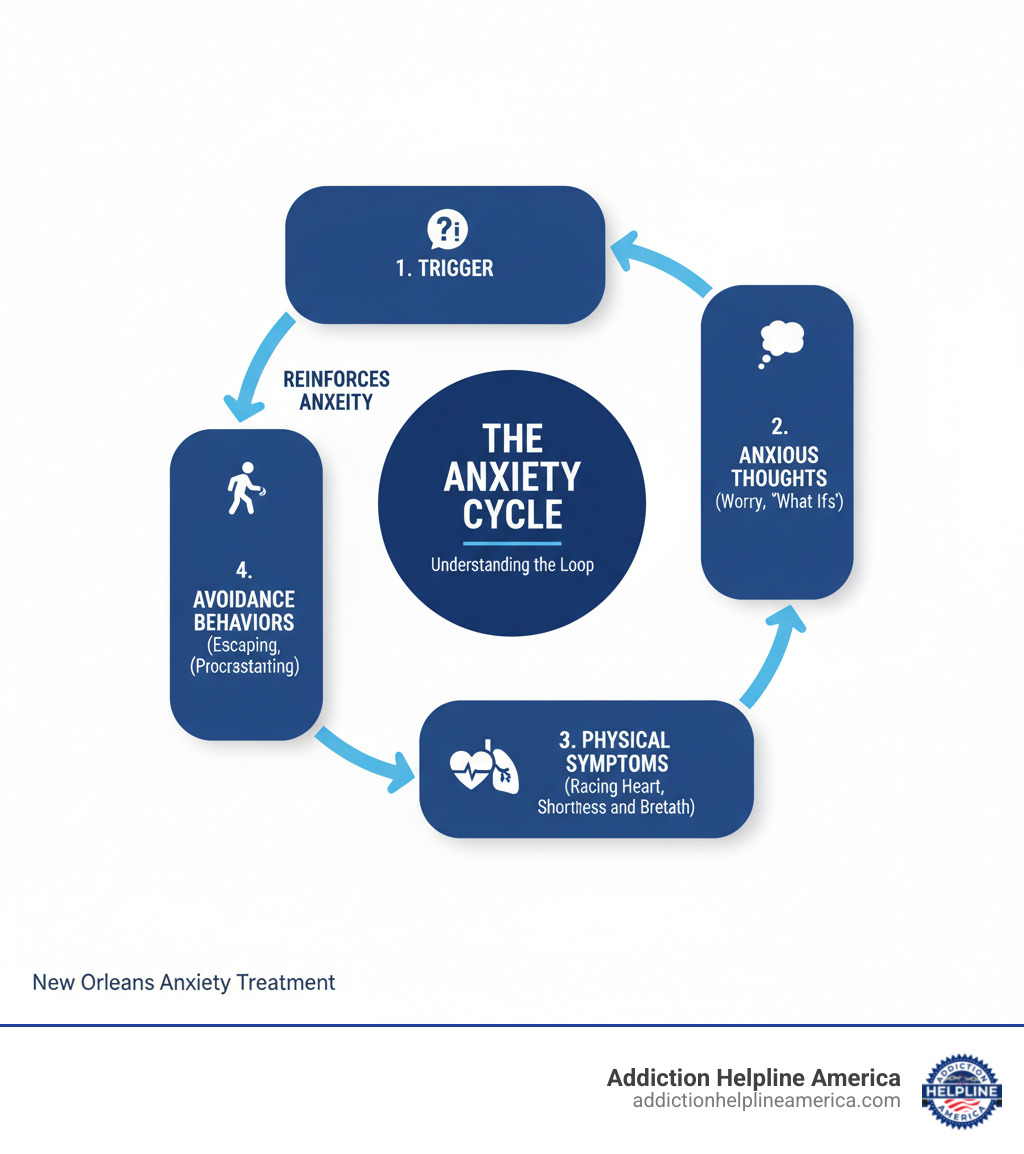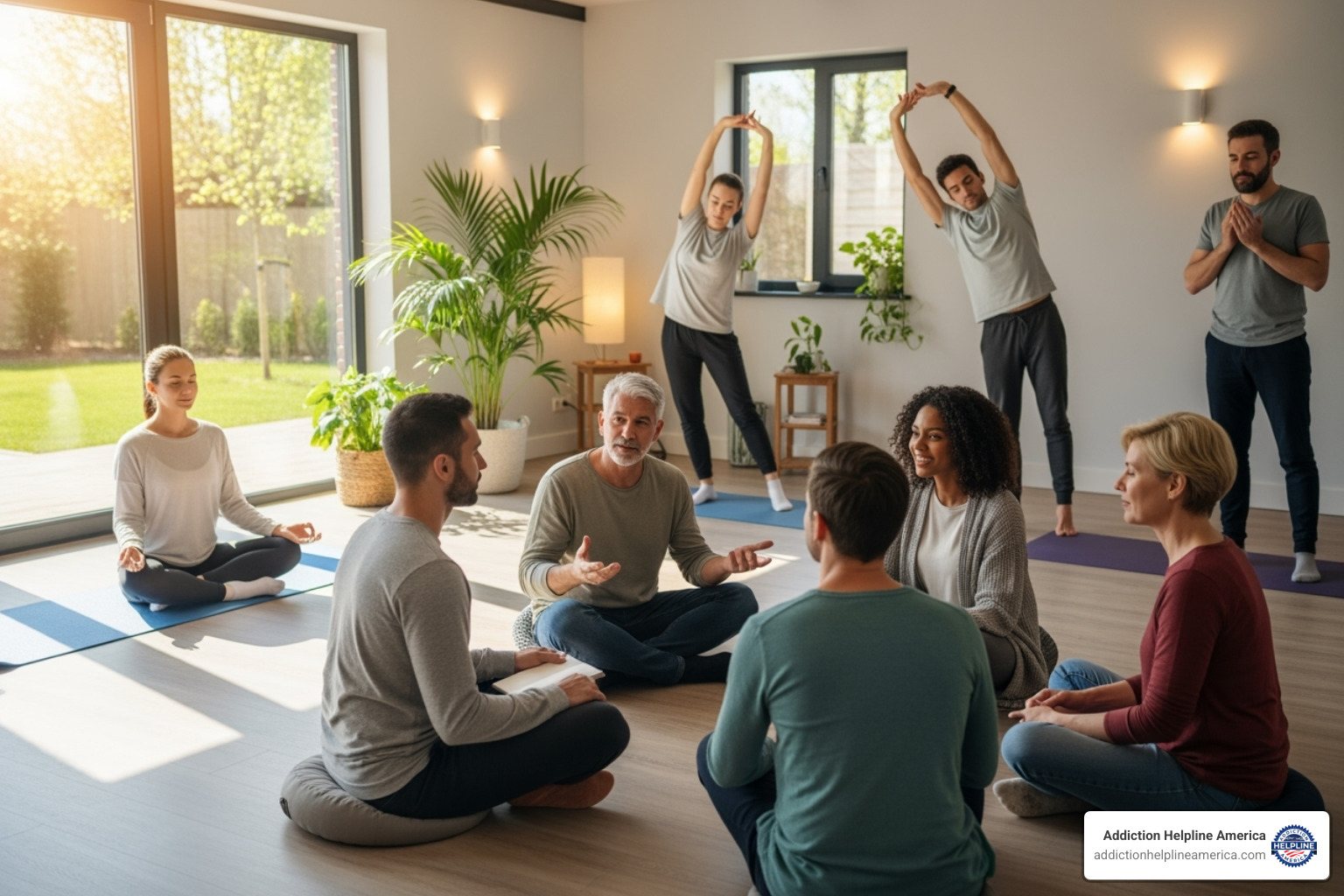
Understanding Anxiety and Finding Hope in New Orleans
Anxiety treatment New Orleans provides a variety of proven options to help you find relief. Here’s a quick guide:
- Therapy Options: Cognitive Behavioral Therapy (CBT), group therapy, and individual counseling for social anxiety, OCD, and PTSD.
- Where to Find Help: Local centers like The Cognitive Behavioral Therapy Center of New Orleans, River Oaks Hospital, and private practitioners.
- Treatment Approaches: Evidence-based therapy, medication, mindfulness, and holistic support.
- Specialized Services: Programs for adolescents, adults, veterans, and those with co-occurring disorders.
- Affordability: Options include major insurance providers, sliding-scale fees, and community health centers.
Anxiety is more than just stress; it’s a medical condition affecting over 18% of American adults. When it becomes persistent, overwhelming, and disrupts your work, relationships, or sleep, it’s time to seek professional help. The good news is that anxiety disorders are highly treatable, with most people seeing significant improvement through a combination of therapy, medication, and lifestyle changes like exercise.
Living in New Orleans presents unique stressors that can heighten anxiety, but our city also has compassionate professionals who understand these pressures. At Addiction Helpline America, we connect New Orleans residents with effective anxiety treatment resources. Whether you’re dealing with panic attacks, constant worry, or anxiety with substance use, we can guide you to the right support.
When to Seek Professional Help for Anxiety
Everyone feels anxious sometimes, but there’s a difference between everyday worry and an anxiety disorder that takes over your life. When anxiety stops being an occasional visitor and starts disrupting your work, relationships, and ability to enjoy life, it’s time to seek professional support. Trying to manage severe anxiety alone, especially with alcohol or other substances, can make things worse. People with anxiety disorders are twice as likely to struggle with substance abuse, a cycle that anxiety treatment New Orleans professionals are equipped to break. For more information on symptoms, the Mayo Clinic offers excellent resources.
Recognizing Physical Signs of Anxiety
Anxiety often manifests physically before your mind catches up. These symptoms can range from annoying to debilitating but respond well to treatment. Look out for:
- Racing heart: A pounding heart even when you’re at rest.
- Shortness of breath: A feeling that you can’t get enough air, which can increase panic.
- Dizziness: Feeling unsteady, which can be mistaken for a more serious medical issue.
- Muscle tension: Chronic tightness, often in the shoulders, neck, and jaw, leading to headaches or teeth grinding (bruxism).
- Sleep disturbances: Difficulty falling asleep, staying asleep, or waking up with racing thoughts.
Recognizing Emotional and Behavioral Signs
As your body sends distress signals, your emotions and behaviors also shift, often shrinking your world. Key signs include:
- Persistent worry: Uncontrollable, excessive worry about worst-case scenarios.
- Irritability: Snapping at others due to constant underlying tension.
- Difficulty concentrating: Anxious thoughts interrupt focus and make decisions feel impossible.
- Avoidance: Skipping situations that trigger anxiety, which can lead to missing out on important life events.
- Feeling on edge: A constant state of high alert, making it impossible to fully relax.
- Panic attacks: Sudden, overwhelming waves of fear accompanied by intense physical symptoms like chest tightness and shaking, making you feel like you might be dying.
If these descriptions resonate with you, know that you are not alone and that these are treatable symptoms. Professional anxiety treatment New Orleans providers understand what you’re going through and can help you find your way back to feeling like yourself.
Common Anxiety Disorders and Proven Treatment Approaches
According to the National Institute on Mental Health, anxiety disorders affect nearly one in five U.S. adults. These conditions share a common thread of excessive fear and worry, but each has unique patterns. Professionals in New Orleans are well-trained to treat the full spectrum of these disorders.
Common anxiety disorders include:
- Generalized Anxiety Disorder (GAD): Persistent, nagging worry about everyday things.
- Social Anxiety Disorder (SAD): An overwhelming fear of being judged in social situations, affecting about 15 million American adults.
- Panic Disorder: Sudden, intense panic attacks that trigger severe physical reactions without any real danger.
- Post-Traumatic Stress Disorder (PTSD): Develops after experiencing trauma, such as a natural disaster like Hurricane Katrina, a violent crime, or military combat.
- Obsessive-Compulsive Disorder (OCD): Unwanted, intrusive thoughts (obsessions) that lead to repetitive behaviors (compulsions).
- Specific Phobias: Intense, irrational fears of particular objects or situations, like flying or needles.
Core Treatment Methods
Fortunately, all of these disorders are treatable. Anxiety treatment New Orleans often involves a combination of therapy and medication, supplemented by holistic approaches.
- Evidence-Based Therapy: The gold standard is Cognitive Behavioral Therapy (CBT), which helps change negative thought patterns. Other effective methods include Dialectical Behavioral Therapy (DBT) for emotion regulation and Eye Movement Desensitization and Reprocessing (EMDR) for trauma. Some local therapists also offer Schema Therapy for deeper, long-standing patterns.
- Medication Management: Supervised by a doctor, medications can be a valuable tool. SSRIs are often prescribed for long-term management, while Benzodiazepines may be used for short-term relief from severe symptoms. An innovative option like TMS Therapy is also available locally for conditions like OCD.
- Holistic Support: A comprehensive approach includes physical health. Regular exercise and proper nutrition support brain chemistry and complement clinical treatments.
Supportive and Complementary Approaches
Supportive practices can significantly improve your healing journey.
- Mindfulness and meditation teach you to observe anxious thoughts without getting carried away by them.
- Yoga combines physical postures, breathing, and meditation to reduce stress. Local centers like River Oaks Treatment Center incorporate it into their programs.
- Breathing exercises are a fast way to activate your body’s relaxation response during moments of high anxiety.
- Building a support system of friends and family who understand your experience is crucial.
- Stress management techniques like journaling and setting boundaries provide practical tools to handle life’s pressures.
Finding Specialized Anxiety Treatment in New Orleans
New Orleans offers a diverse community of mental health professionals ready to support you. Finding the right fit is a key first step toward healing.
- Individual counseling provides personalized, one-on-one attention to explore your specific triggers and develop custom coping strategies. Practitioners like Ann Abbrecht, LPC, and John Ormond, a Certified Schema Therapist, specialize in anxiety treatment in New Orleans.
- Group support can be incredibly healing, connecting you with others who share similar experiences. The Cognitive Behavioral Therapy Center of New Orleans offers a 12-week social anxiety group, while facilities like River Place Behavioral Health incorporate group therapy into their programs.
- Outpatient programs offer intensive support while allowing you to maintain your daily responsibilities, providing a middle ground between weekly therapy and residential care.
- Specialized services are available for different age groups, such as adolescents and adults, as well as for co-occurring disorders. Since anxiety and substance use often go hand-in-hand, integrated treatment is crucial. Facilities like NOLA Detox and Recovery Center and River Oaks Treatment Center offer comprehensive programs for these dual diagnoses.
At Addiction Helpline America, we understand that finding the right fit can be overwhelming. We’re here to help you sort through these options and connect you with a provider who meets your needs.
The Power of Cognitive Behavioral Therapy (CBT)
Cognitive Behavioral Therapy (CBT) is widely regarded as one of the most effective forms of anxiety treatment New Orleans has to offer. It’s a practical, short-term, and goal-oriented approach backed by decades of research.
CBT is based on the idea that your thoughts, feelings, and behaviors are connected. It teaches you to:
- Identify and challenge negative thoughts: Recognize distorted thinking patterns that fuel anxiety and replace them with more realistic perspectives.
- Change behavioral patterns: Gradually face fears through exposure therapy, building confidence and proving to your brain that feared outcomes are unlikely.
CBT works well in group settings, especially for social anxiety, and can be integrated into a comprehensive treatment plan with medication, mindfulness, and other therapies.
How to Find and Afford Anxiety Care in NOLA
Finding the right anxiety treatment New Orleans is more accessible and affordable than you might think. Here’s how to get started and steer the costs.
When looking for a provider, you can:
- Use online directories: Websites like Psychology Today or the Anxiety and Depression Association of America’s therapist finder let you search by location, specialty, and insurance.
- Check your insurance provider’s list: Your insurer’s website or customer service line will have a directory of in-network mental health professionals.
- Ask for a referral: Your primary care doctor can recommend a trusted local professional who fits your needs.
- Seek word-of-mouth recommendations: Ask trusted friends or family if they have a therapist they’d recommend.
Once you find potential providers, check their credentials (e.g., LPC, LCSW, PhD) to ensure they meet professional standards.
Affordable Options and Community Resources
Cost should not be a barrier to getting help. Consider these affordable pathways:
- University counseling centers: Institutions like Tulane and Loyola often provide low-cost therapy through their graduate training programs, supervised by experienced faculty.
- Sliding-scale fees: Many private practitioners and clinics adjust their rates based on your income. Don’t hesitate to ask about this option.
- Health insurance: Many plans cover therapy with just a copay. Call your provider to understand your mental health benefits, including coverage for outpatient sessions.
- Community health centers: These centers provide mental health services on a sliding scale, regardless of your ability to pay.
- Peer support groups: Local organizations throughout New Orleans host free or low-cost meetings where you can connect with others who understand anxiety firsthand.
At Addiction Helpline America, we can help you steer the system. Our guidance is free and confidential, connecting you with the right anxiety treatment New Orleans resources for your situation.
Frequently Asked Questions about Anxiety Treatment
How long does anxiety treatment take to work?
There’s no one-size-fits-all timeline, but you can expect some general patterns. With consistent therapy, many people notice improvements within 5 to 20 weekly sessions. Medications like antidepressants typically take two to four weeks to show a noticeable benefit, while some anti-anxiety medications work within minutes. Your progress will be unique, depending on the type of anxiety, your commitment to treatment, and other life factors. Consistency is key, whether in therapy, medication, or complementary practices like meditation.
What are the benefits of a specialized anxiety program vs. individual therapy?
The best choice depends on your needs. Specialized anxiety programs offer intensive structure, with daily schedules of multiple therapies (individual, group, holistic) and powerful peer support. This immersive environment is ideal if anxiety is severely disrupting your life. Individual therapy offers personalized, undivided attention, allowing for deep, custom work on your specific triggers and goals. It also provides more flexibility in scheduling and pacing. Many people find their needs change over time, sometimes starting with one and moving to the other.
How do I know if my anxiety treatment is effective?
There are clear signs your anxiety treatment New Orleans is working:
- Symptom reduction: You experience fewer panic attacks, less constant worry, and better sleep.
- Improved daily functioning: You’re able to engage in activities you once avoided, like socializing or going to the store without a detailed escape plan.
- Meeting therapy goals: You and your therapist will set specific goals, and achieving them is a concrete sign of progress.
- Feeling more in control: You develop the skills to manage anxiety, recognize triggers, and use coping techniques effectively.
Open communication with your provider is essential to track progress and adjust your plan as needed. Research shows that anxiety treatment is highly effective, so with consistent effort, lasting improvement is not just possible—it’s probable. Addiction Helpline America has seen countless people reclaim their lives from anxiety, and we’re here to help you find your path.
Take the First Step Towards a Calmer Life
If you’ve read this guide, you’ve already taken an important step. We’ve explored the many faces of anxiety and the proven pathways to relief available through anxiety treatment New Orleans, from Cognitive Behavioral Therapy to mindfulness practices.
Here’s what matters most: recovery is absolutely achievable. Anxiety disorders are highly treatable, and you are not alone in this struggle. Thousands have walked this path and found their way to a calmer, fuller life.
The hardest part is often starting. Concerns about cost or where to begin are understandable, but they shouldn’t stand in your way.
That’s where Addiction Helpline America comes in. We offer free, confidential guidance to help you steer your options. We listen to your situation and connect you with anxiety treatment New Orleans resources that fit your unique needs, whether it’s individual therapy, a specialized program, or support for co-occurring conditions.
You don’t have to figure this out alone. Our team is ready to help you take that crucial first step.
Find a personalized anxiety treatment program today. Your journey toward relief starts with a single conversation.
Our helpline is 100%
free & confidential
If you or someone you care about is struggling with drug or alcohol addiction, we can help you explore your recovery options. Don’t face this challenge alone—seek support from us.
Programs
Resources
Will my insurance
cover addiction
treatment?
We're ready to help
Find the best
drug or alcohol treatment
center
Are you or a loved one struggling with addiction? Call today to speak to a treatment expert.
















